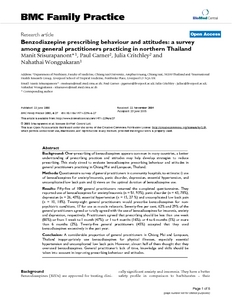Srisurapanont, M; Garner, P; Critchley, J; Wongpakaran, N
(2005)
Benzodiazepine prescribing behaviour and attitudes: a survey among general practitioners practicing in northern Thailand.
BMC Family Practice, 6 (27).
ISSN 1471-2296
https://doi.org/10.1186/1471-2296-6-27
SGUL Authors: Critchley, Julia
![[img]](https://openaccess.sgul.ac.uk/1738/1.hassmallThumbnailVersion/1471-2296-6-27.pdf)  Preview |
|
["document_typename_application/pdf; charset=binary" not defined]
Published Version
Download (235kB)
| Preview
|
Abstract
BACKGROUND: Over-prescribing of benzodiazepines appears common in many countries, a better understanding of prescribing practices and attitudes may help develop strategies to reduce prescribing. This study aimed to evaluate benzodiazepine prescribing behaviour and attitudes in general practitioners practising in Chiang Mai and Lampoon, Thailand.
METHODS: Questionnaire survey of general practitioners in community hospitals, to estimate: i) use of benzodiazepines for anxiety/insomnia, panic disorder, depression, essential hypertension, and uncomplicated low back pain and ii) views on the optimal duration of benzodiazepine use.
RESULTS: Fifty-five of 100 general practitioners returned the completed questionnaires. They reported use of benzodiazepines for anxiety/insomnia (n = 51, 93%), panic disorder (n = 43, 78%), depression (n = 26, 43%), essential hypertension (n = 15, 27 %) and uncomplicated low back pain (n = 10, 18%). Twenty-eight general practitioners would prescribe benzodiazepines for non-psychiatric conditions, 17 for use as muscle relaxants. Seventy-five per cent, 62% and 29% of the general practitioners agreed or totally agreed with the use of benzodiazepines for insomnia, anxiety and depression, respectively. Practitioners agreed that prescribing should be less than one week (80%); or from 1 week to 1 month (47%); or 1 to 4 months (16%); or 4 to 6 months (5%) or more than 6 months (2%). Twenty-five general practitioners (45%) accepted that they used benzodiazepines excessively in the past year.
CONCLUSION: A considerable proportion of general practitioners in Chiang Mai and Lampoon, Thailand inappropriately use benzodiazepines for physical illnesses, especially essential hypertension and uncomplicated low back pain. However, almost half of them thought that they overused benzodiazepines. General practitioner's lack of time, knowledge and skills should be taken into account in improving prescribing behaviour and attitudes.
| Item Type: |
Article
|
| Additional Information: |
PMCID: PMC1182364
© 2005 Srisurapanont et al; licensee BioMed Central Ltd. This is an Open Access article distributed under the terms of the Creative Commons Attribution License (http://creativecommons.org/licenses/by/2.0), which permits unrestricted use, distribution, and reproduction in any medium, provided the original work is properly cited. |
| Keywords: |
Adult, Anti-Anxiety Agents, Attitude of Health Personnel, Benzodiazepines, Drug Utilization Review, Family Practice, Female, Health Services Misuse, Hospitals, Community, Humans, Hypertension, Low Back Pain, Male, Mental Disorders, Neuromuscular Agents, Physician's Practice Patterns, Questionnaires, Thailand |
| SGUL Research Institute / Research Centre: |
Academic Structure > Population Health Research Institute (INPH) |
| Journal or Publication Title: |
BMC Family Practice |
| ISSN: |
1471-2296 |
| PubMed ID: |
15975145 |
| Web of Science ID: |
15975145 |
| Dates: |
| Date |
Event |
| 2005-06-23 |
Published |
|
  |
Download EPMC Full text (PDF)
|
 |
Download EPMC Full text (HTML)
|
 |
Go to PubMed abstract |
| URI: |
https://openaccess.sgul.ac.uk/id/eprint/1738 |
| Publisher's version: |
https://doi.org/10.1186/1471-2296-6-27 |
Statistics
Item downloaded times since 01 May 2012.
Actions (login required)
 |
Edit Item |




